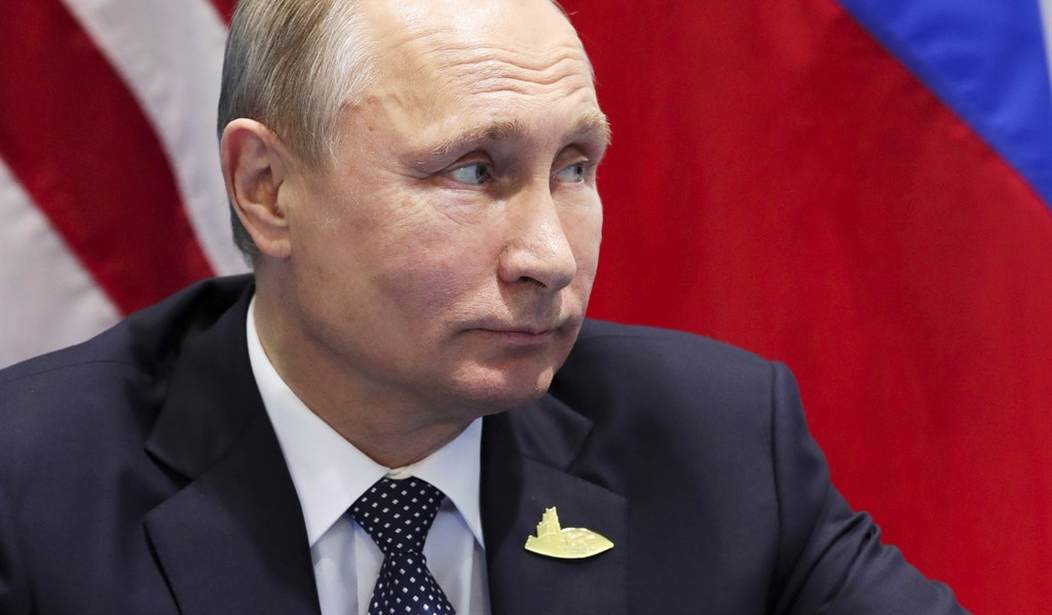Makes sense if you read this post yesterday about the bill, although I’m still a little surprised to see Trump acquiesce. “Aides say the quickest way to get Trump to do something is to tell him he can’t,” wrote Mike Allen this morning about the uproar over potential Russiagate pardons. Well, Congress just told him “you can’t” with respect to unilaterally lifting Russia sanctions. Trump must be sorely tempted to stick it to them with a veto. But to what end? The House and Senate have the numbers needed to override his veto, guaranteeing that the bill will become law anyway while giving Trump a black eye. (John Thune, the number three Republican in the Senate, warned Trump in his own TV appearance this morning that a veto would be futile.) And even if they couldn’t override it, Trump would be spending political capital to defeat a bill that sought to punish … Russia. The last thing he needs is to give his critics new cause to call him a Putin stooge.
Sarah Huckabee Sanders’s spin on why Trump is giving in is interesting. She can’t tell the truth here — “he has no choice politically” — so she falls back on a process argument:
But on Sunday, Ms. Sanders said on ABC’s “This Week” that necessary changes had been made to the legislation. “Look, the administration is supportive of being tough on Russia, particularly in putting these sanctions in place,” she said. “The original piece of legislation was poorly written but we were able to work with the House and Senate. … And we support where the legislation is now.”
The group that’s been complaining most loudly lately that the original bill was “poorly written” is Democrats. They objected to the fact that the bill gave the minority party in the House and Senate no way to force a vote on a resolution of disapproval if/when Trump declares that he wants to lift sanctions on Russia. Pelosi and Schumer were afraid Ryan and McConnell would try to shield Trump by refusing to allow a vote on such a resolution. The new bill resolves that dispute in Democrats’ favor by empowering the minority leader in both chambers to bring a resolution to the floor themselves, which ties Trump’s hands even further. The White House lobbied Ryan and McConnell not to limit his leverage in negotiating with Putin by taking sanctions relief out of his hands and instead they handed some of his leverage to Schumer and Pelosi. If Huckabee Sanders thinks that represents an improvement over the “poorly written” original bill, um, okay.
The silver lining for Trump in having to sign this bill is that he can use it as a defense to collusion charges, as Huckabee Sanders does here. Would a shill for Russia sign a bill that makes it harder to lift sanctions on Moscow? Well, there you go. His critics will answer that he’s only signing it because he’s been outmaneuvered by Congress, but that won’t stop Trump from using it as evidence that he’s tough on Putin. Remember, he’s being citing the fact that Don Jr published his emails with Rob Goldstone on Twitter as proof of “transparency” even though Junior only did that because he knew a NYT story detailing the emails was about to drop at any moment. Just one wrinkle, though: According to Anthony Scaramucci in the second clip below, as recently as yesterday the president was still questioning whether Russia was guilty of hacking during the campaign, claiming that their spycraft is too sophisticated to be so easily detected. (Which sounds alarmingly like the sort of claim Putin himself would have made to Trump during their meetings at the G20.) If he’s going to sign the sanctions bill and use it as “proof” that he’s not a Russia apologist, maybe it’s time to stop sounding like a Russia apologist on the campaign hacks too.
Incidentally, Scaramucci isn’t as sure as Huckabee Sanders is that Trump will sign the bill. Hmmmm. Exit question: If Trump’s looking for a way to veto with minimal political damage, why not frame it as a matter of constitutional principle? Congress can’t usurp the executive’s power to conduct America’s foreign policy under Article II by limiting his options on sanctions, he could argue. That argument may or may not prevail in court (likely not), and it would be rich of Trump to claim a constitutional objection as grounds for blocking a policy when he’s maintained Obama’s DREAM amnesty after calling it unconstitutional during the campaign. But it would give him a slim chance of thwarting Congress’s attempt to tie his hands. And it would remind his base that he’s a “fighter,” even if that means fighting his own party.








Join the conversation as a VIP Member